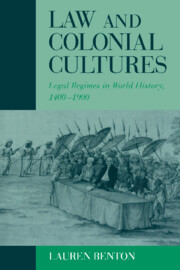Book contents
- Frontmatter
- Contents
- Acknowledgments
- 1 Legal Regimes and Colonial Cultures
- 2 Law in Diaspora: The Legal Regime of the Atlantic World
- 3 Order out of Trouble: Jurisdictional Tensions in Catholic and Islamic Empires
- 4 A Place for the State: Legal Pluralism As a Colonial Project in Bengal and West Africa
- 5 Subjects and Witnesses: Cultural and Legal Hierarchies in the Cape Colony and New South Wales
- 6 Constructing Sovereignty: Extraterritoriality in the Oriental Republic of Uruguay
- 7 Culture and the Rule(s) of Law
- Bibliography
- Index
5 - Subjects and Witnesses: Cultural and Legal Hierarchies in the Cape Colony and New South Wales
Published online by Cambridge University Press: 18 December 2009
- Frontmatter
- Contents
- Acknowledgments
- 1 Legal Regimes and Colonial Cultures
- 2 Law in Diaspora: The Legal Regime of the Atlantic World
- 3 Order out of Trouble: Jurisdictional Tensions in Catholic and Islamic Empires
- 4 A Place for the State: Legal Pluralism As a Colonial Project in Bengal and West Africa
- 5 Subjects and Witnesses: Cultural and Legal Hierarchies in the Cape Colony and New South Wales
- 6 Constructing Sovereignty: Extraterritoriality in the Oriental Republic of Uruguay
- 7 Culture and the Rule(s) of Law
- Bibliography
- Index
Summary
While the colonial project of legal pluralism was slowly producing a space for the colonial state as a repository of rules about legal interactions, in some settings the shift to state legal hegemony took place earlier and without the creation of an elaborate system of multiple legal spheres. A tentative, “weak” pluralism that recognized the legal authority of indigenous groups without proscribing a formal plan for the interaction of colonial and indigenous law gave way within the space of several decades to more sweeping claims of legal hierarchy. This shift, still, was not uncontested, nor did it result in uniform treatment of indigenous legal subjects in colonial courts.
The legal models of jurisdictional complexity that informed Iberians' strategies and inspired the plural legal order of India were based loosely on the jurisdictional divisions between canon and secular law. But this model was not the only one available to Europeans. As Pagden has argued, Roman law was a source of multiple “discursive possibilities” for representing and legitimating overseas empire. European powers drew on these rhetorical resources in various combinations to distinguish their claims from those of other colonizing powers and to legitimize conquest and colonization. This process continued a well-established tradition of using Roman texts as what Peter Stein has called a “legal supermarket.”
English theorists, for example, countered Spanish claims of conquest in the Americas by asserting that English settlers had not conquered New World territories but had merely occupied them.
- Type
- Chapter
- Information
- Law and Colonial CulturesLegal Regimes in World History, 1400–1900, pp. 167 - 209Publisher: Cambridge University PressPrint publication year: 2001



